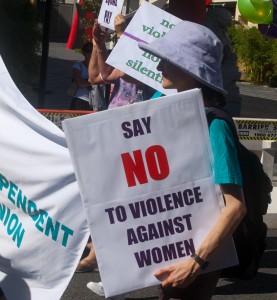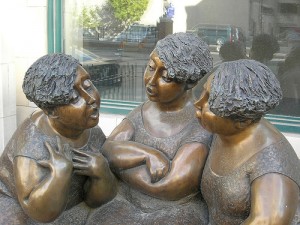Biblical Women Doing What Needs to Be Done: Podcast with Catherine Caine
Madame President, will you submit to your husband?
Earlier this year I published a little E-book called What You Didn’t Learn in Sunday School: Women Who Didn’t Shut Up & Sit Down. I interviewed four amazing people about the E-book to see what they thought about it. I didn’t limit myself to Christians: two of my interviews were with women who aren’t Christians. Catherine Caine was one of those women.
Originally I bundled these podcasts with the book, but I’ve decided to make them available on the blog, free of charge. Why? Because of things I keep seeing. First there was the Republican presidential debate where Michelle Bachmann was asked if she would submit to her husband while president. I’m sure all of you saw the firestorm that created on both TV and the internet.
But it’s not a valid question because women are no longer the property of their husbands just like we in the Western world no longer own slaves. Just as the biblical commands to slaves are no longer applicable in today’s world, neither are the commands for women to submit to their husbands. The oldest man in the family is no longer the dictator of the entire family; therefore, the commands to the domain of his dictatorship no longer exists. It’s time for Christians to move on and refine their views of marriage to reflect the truth of marriage today: we choose who we marry and enter into marriage as two equals. Our marriages are no longer arranged by parents to get political and social power, where marriage was a power structure just as the Roman heirarchy was a power structure. There are no longer any Caesars making decrees for an entire empire, and in the Western World, there is no longer the family patriarch reigning from on high over the entire clan.
Tell me sweet little lies
The other reason I’m posting the podcasts this month is because of a horrible curriculum recently released by The Council of Biblical Manhood and Womanhood*called “Rejoicing in God’s Good Design: A Study for Youth on Biblical Manhood and Womanhood”*.
(*I’m not sending my people to these sites directly, plus I am not helping their SEO rankings. You want to see it for yourself, Google them. Ditto with Bachmann.)
Suzanne McCarthy and J. K. Gayle brought this curriculum to my attention at the end of August.
Here a couple of quotes from the curriculum itself:
While God created men to be generally oriented toward work, God created women to be generally oriented towards relationships of helpfulness and companionship.(Via Suzanne.)
This is God’s good design.
A design for male headship — leading, protecting, and providing for the woman.
A design for female submission — submitting to and helping the man; a companion-helper ‘fit for him.’
Some will be doubtful … even upset by this teaching of God’s good design for men and women. (Via J. K.)
Yes I am upset about this. But not because it’s Godde’s good design. I’m upset because it’s one big, fat lie. If you want to see a drastically different way to interpret these same verses read this: Does It Really Mean Helpmate?
Suzanne did a wonderful job showing the lie of “a man’s orientation is to work and a woman’s orientation is to helping” in her brilliant series, A Women’s Orientation to Work ( Parts 2, 3, and 4).
Yes, I released this book a few months ago with hype and marketing. And now I’m going to hype it and market it some more.
BECAUSE OF LIES LIKE THIS THAT ARE ALIVE AND WELL IN OUR WORLD.
This is the reason I wrote Women Who Didn’t Shut Up and Sit Down–to show that Conservative and Fundamentalist Christianity is touting only one of the ways to interpret Scriptures. There are other ways (many other ways) to interpret what the Bible has to say about men, women, and marriage.
That’s why I’m releasing the podcasts, and that’s why you’re going to hear a whole lot about both the podcasts and the E-book in the next month or so. Because people are asking women politcians if they submit to their husbands (would a male politician be asked if he loved his wife the way Christ loved the church in a debate?).
I’m doing this because the so-called “Biblical” Council of Manhood and Womanhood are releasing curriculum that is lying to our children and teens about their relationships with each other. Sunday School teachers and youth leaders: if you want to show your kids actual Biblical relationships, buy Women Who Didn’t Shut Up and Sit Down. You only need to buy the E-book once then you can print off as many copies as you need. Make sure your kids hear a different way to interpret what the Bible says: give them a way to defend themselves and present another view when they’re told that Godde made women to be submissive helpers.
Godde made men and women as equals in all areas of life to stand by stand and show people what the image of Godde looks like: male and female working together to building Godde’s kingdom of love right here, right now.
Stop the lies. Learn the truth for yourselves. Then teach it to your children. Buy Women Who Didn’t Shut Up & Sit Down Now. (Then you can listen to the brilliant podcast of Catherine Caine.)

Catherine Caine
Catherine Caine is a Magnificence Amplifier. What is that you might wonder. I’ll let her tell you:
I help people uncover and amplify their absolutely best work – the work that brings the most profound impact into their lives and the lives of everyone around them. It doesn’t matter what the work IS – the world is still a better place every time there’s another person working to stretch the limits of their potential and create work that matters profoundly to them and to their bestest people.
I do that in three ways:
I translate and filter the jumble of thoughts ping-ponging around in your mind so you can identify and articulate your best work. There are no one-size-fits-all answers – it’s impossible to strive for splendiferous amazing work until you know what splendiferous looks like to you. (And feels like, smells like, tastes like…)
I light the path for you to discover the permission to strive for that amazing work. (Note that I don’t give you permission, I help you find your own permission. I’m not a permission idol: it’s much smarter for you to have your strength in your pocket.)
And I turn the dial up to 11, with effective, brand-consistent, conventional and unconventional, feel-good-in-the-morning, damn fun marketing strategy that focuses on identifying the people who would love the living hell out of your best work, and rocking their worlds until they adore you and can’t wait to buy what you’re selling.
You will find Catherine at Cash and Joy where she helps people like me figure out how to get the word out about our products and services. But that’s not Catherine’s real superpower. Her real superpower is storytelling. She doesn’t give you dried and worn-out facts and datum, she tells stories that help you connect the dots in your own business and make you think about how to go about marketing yourself. She’s one of the most brilliant storytellers I’ve come across online, and even if you don’t need any marketing advice, you should go read her stories.
Catherine is a secular humanist who lives in Australia. Why am I interviewing a secular humanist for an E-book about the women of the Bible? Because traditional belief about women and their place in the world, does not effect only women in the church. For years Western Christian Europe and the USA conquered and colonized most of the world and evangelized along the way. This means the beliefs that women should be subordinate to men and stay at home have traveled all around the world disguised as what the Bible says. The mistranslations and misinterpretations I cover in the book, along with the marginalization of the women in the Bible, effect women whether they’re Christians or not. Many fundamentalist Christians believe women joining the work force and wanting to be ordained and leaders in the church, is killing society as we know it. Feminism is the reason for higher divorce rates and the downfall of the family in the USA according to some fundamentalist camps. There are Christian men in the workforce who tell their female co-workers they shouldn’t be there. I want these women to have a safe place to come and find resources to help them deal with the Christian patriarchy wherever they might encounter it. I want this website to be a resource for both Christian women and non-Christian women. That’s why I interviewed Catherine.
Podcast: CatherineCaineFull.mp3
Find out what strong, intelligent, and incredible women populate the pages of the Bible. See what Godde had in mind when she created women in her image. Buy Women Who Didn’t Shut Up & Sit Down.






